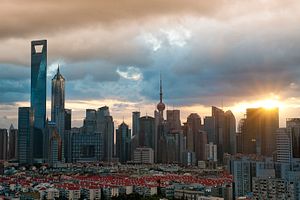Taiwan-based bakery company 85C Bakery Cafe got themselves into trouble in China — not by doing anything wrong, but by not declining a visit from Taiwan’s President Tsai Ing-wen in Los Angeles. Because Tsai was welcomed and greeted while visiting one of the branches of the 85C Bakery Cafe, Chinese state media guancha.cn called 85C Cafe a supporter of Taiwan’s independence and provoked Chinese citizens to boycott the Taiwan-based bakery.
Jiangsu Cyberspace Police later published an article calling the Taiwan-based business to leave China: “We will add another 15 degrees to your business and let you get out of the country.”
85C Cafe released an official statement after the Tsai visit incident. The company argued that it firmly holds the 1992 Consensus and clarified that the bakery had not offered Tsai any gifts. Rather, a photo circulating online showed one of the employees asking for an autograph from Tsai Ing-wen.
However, 85C Cafe’s businesses were later removed from several food delivery platforms that are operating in mainland China. Various Chinese state media, such as People’s Daily, Global Times, and guancha.cn all reposted the message.
Ironically, Chinese state media do not seem to be consistent in their stances on bashing the “pro-independence’” 85C Cafe. In a past news report, Chinese state media outlet People’s Daily presented 85C Cafe as a positive example of the food diversity that is available in Beijing in 2012.
Taiwan officials called China’s action against 85C Cafe reckless and unreasonable. One Taiwan legislator said that the official statement that 85C Cafe was forced to make sounded like what a hostage would say when captured by terrorists.
The “one China” policy has been a hard line for the Chinese government since 1949. The Chinese Communist Party (CCP) government insists on its absolute legitimacy in claiming all territories of the “Greater China Region,” including Taiwan, which is a de facto state governed by democratic institutions that holds its own presidential elections every four years.
More and More “Orwellian Nonsense”
The dramatic pressure that 85C Cafe faced in China is just the tip of the iceberg. Over the past few years, Chinese officials have made numerous unreasonable demands on foreign businesses in China over ideological matters that have little connection to the actual businesses. In 2018 alone, China has taken action against Marriott and more than 40 foreign airlines over its claim to Taiwan. Another report from VOA Chinese shows that Educational Testing Service, a United States-based nonprofit organization for testing services, also changed the status of Taiwan to “Taiwan, China.” China has managed to successfully coerce these businesses to comply with its orders and has yet to receive any punishments.
Despite a statement from U.S. President Donald Trump calling China’s censorship against foreign corporations “Orwellian nonsense,” the international community offered very little in the way of sanctions or measurable actions against the authoritarian Chinese state’s interference against foreign companies.
With its increasingly large economic and diplomatic power, China is attempting to force foreign corporations and business entities to comply with its own ideological beliefs, such as recognizing Taiwan as part of China. In addition to achieving diplomatic gains, China also aims to gain more control over economic activity by setting up CCP organizations within foreign corporations. In 2017, German businesses in China threatened to quit their operations in China to protest against the state’s attempt to influence the foreign enterprises.
China has a long history in setting up Communist Party divisions among foreign businesses. According to a 2007 Beijing Daily report, foreign enterprises such as Siemens, PwC, and Citi Bank all have their respective Party divisions that manage CCP members working within the company.
Ideology Always Comes First in China
The concerning fact, however, is that China is now seeking to use its influence to dominate how businesses operate not only in regions within its sovereignty, but also in their global operations.
By forcing foreign airlines and Marriott to recognize Taiwan as part of China, the Chinese authorities are stepping up on limits on how international companies do business outside of China. China’s ambition does not stop at its sovereign borders, but now extends overseas.
The world’s second largest economy has a deceptive appearance. The skyscrapers, mass consumption, and business miracles may make people feel that China is adopting a market economy model. However, despite China’s economic achievements, its economic structure is built on intense government influence and interventions. The Chinese government imposes very strict control on business activities that are within the country as well as international imports and exports. China’s economic structure is nowhere close to a free market economy. Rather, it is an economy that is heavily dominated by state power and government decisions.
For businesses that are yet to enter China or tap into the massive number of potential Chinese consumers, China may be a country with huge investment potential and future profits. However, entering the Chinese market is not a decision that can be made with a simple calculation of revenues and costs, but a decision that requires a throughout assessment of the company’s ability to handle arbitrary and unreasonable demands from the Chinese government. Foreign corporations that are still operating or considering additional investments in China, they should start to re-evaluate their positions and prepare for larger risks that could arise from the increasingly sensitive Chinese government.
Chauncey Jung is a China internet specialist who previous worked for various Chinese internet companies in Beijing.

































